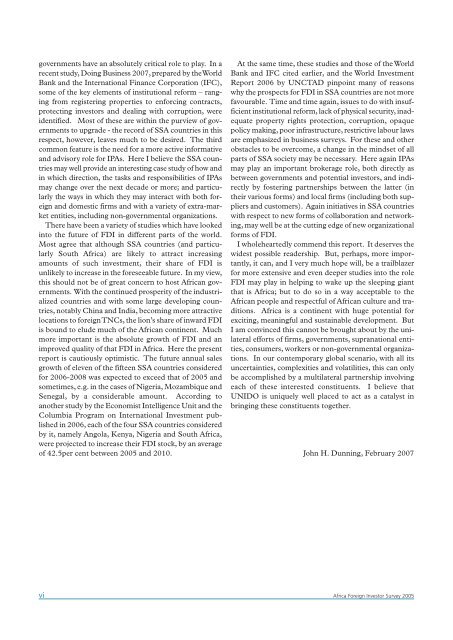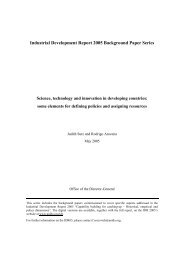Africa Foreign Investor Survey 2005 - unido
Africa Foreign Investor Survey 2005 - unido
Africa Foreign Investor Survey 2005 - unido
Create successful ePaper yourself
Turn your PDF publications into a flip-book with our unique Google optimized e-Paper software.
governments have an absolutely critical role to play. In a<br />
recent study, Doing Business 2007, prepared by the World<br />
Bank and the International Finance Corporation (IFC),<br />
some of the key elements of institutional reform – ranging<br />
from registering properties to enforcing contracts,<br />
protecting investors and dealing with corruption, were<br />
identified. Most of these are within the purview of governments<br />
to upgrade - the record of SSA countries in this<br />
respect, however, leaves much to be desired. The third<br />
common feature is the need for a more active informative<br />
and advisory role for IPAs. Here I believe the SSA countries<br />
may well provide an interesting case study of how and<br />
in which direction, the tasks and responsibilities of IPAs<br />
may change over the next decade or more; and particularly<br />
the ways in which they may interact with both foreign<br />
and domestic firms and with a variety of extra-market<br />
entities, including non-governmental organizations.<br />
There have been a variety of studies which have looked<br />
into the future of FDI in different parts of the world.<br />
Most agree that although SSA countries (and particularly<br />
South <strong>Africa</strong>) are likely to attract increasing<br />
amounts of such investment, their share of FDI is<br />
unlikely to increase in the foreseeable future. In my view,<br />
this should not be of great concern to host <strong>Africa</strong>n governments.<br />
With the continued prosperity of the industrialized<br />
countries and with some large developing countries,<br />
notably China and India, becoming more attractive<br />
locations to foreign TNCs, the lion’s share of inward FDI<br />
is bound to elude much of the <strong>Africa</strong>n continent. Much<br />
more important is the absolute growth of FDI and an<br />
improved quality of that FDI in <strong>Africa</strong>. Here the present<br />
report is cautiously optimistic. The future annual sales<br />
growth of eleven of the fifteen SSA countries considered<br />
for 2006-2008 was expected to exceed that of <strong>2005</strong> and<br />
sometimes, e.g. in the cases of Nigeria, Mozambique and<br />
Senegal, by a considerable amount. According to<br />
another study by the Economist Intelligence Unit and the<br />
Columbia Program on International Investment published<br />
in 2006, each of the four SSA countries considered<br />
by it, namely Angola, Kenya, Nigeria and South <strong>Africa</strong>,<br />
were projected to increase their FDI stock, by an average<br />
of 42.5per cent between <strong>2005</strong> and 2010.<br />
At the same time, these studies and those of the World<br />
Bank and IFC cited earlier, and the World Investment<br />
Report 2006 by UNCTAD pinpoint many of reasons<br />
why the prospects for FDI in SSA countries are not more<br />
favourable. Time and time again, issues to do with insufficient<br />
institutional reform, lack of physical security, inadequate<br />
property rights protection, corruption, opaque<br />
policy making, poor infrastructure, restrictive labour laws<br />
are emphasized in business surveys. For these and other<br />
obstacles to be overcome, a change in the mindset of all<br />
parts of SSA society may be necessary. Here again IPAs<br />
may play an important brokerage role, both directly as<br />
between governments and potential investors, and indirectly<br />
by fostering partnerships between the latter (in<br />
their various forms) and local firms (including both suppliers<br />
and customers). Again initiatives in SSA countries<br />
with respect to new forms of collaboration and networking,<br />
may well be at the cutting edge of new organizational<br />
forms of FDI.<br />
I wholeheartedly commend this report. It deserves the<br />
widest possible readership. But, perhaps, more importantly,<br />
it can, and I very much hope will, be a trailblazer<br />
for more extensive and even deeper studies into the role<br />
FDI may play in helping to wake up the sleeping giant<br />
that is <strong>Africa</strong>; but to do so in a way acceptable to the<br />
<strong>Africa</strong>n people and respectful of <strong>Africa</strong>n culture and traditions.<br />
<strong>Africa</strong> is a continent with huge potential for<br />
exciting, meaningful and sustainable development. But<br />
I am convinced this cannot be brought about by the unilateral<br />
efforts of firms, governments, supranational entities,<br />
consumers, workers or non-governmental organizations.<br />
In our contemporary global scenario, with all its<br />
uncertainties, complexities and volatilities, this can only<br />
be accomplished by a multilateral partnership involving<br />
each of these interested constituents. I believe that<br />
UNIDO is uniquely well placed to act as a catalyst in<br />
bringing these constituents together.<br />
John H. Dunning, February 2007<br />
vi <strong>Africa</strong> <strong>Foreign</strong> <strong>Investor</strong> <strong>Survey</strong> <strong>2005</strong>
















